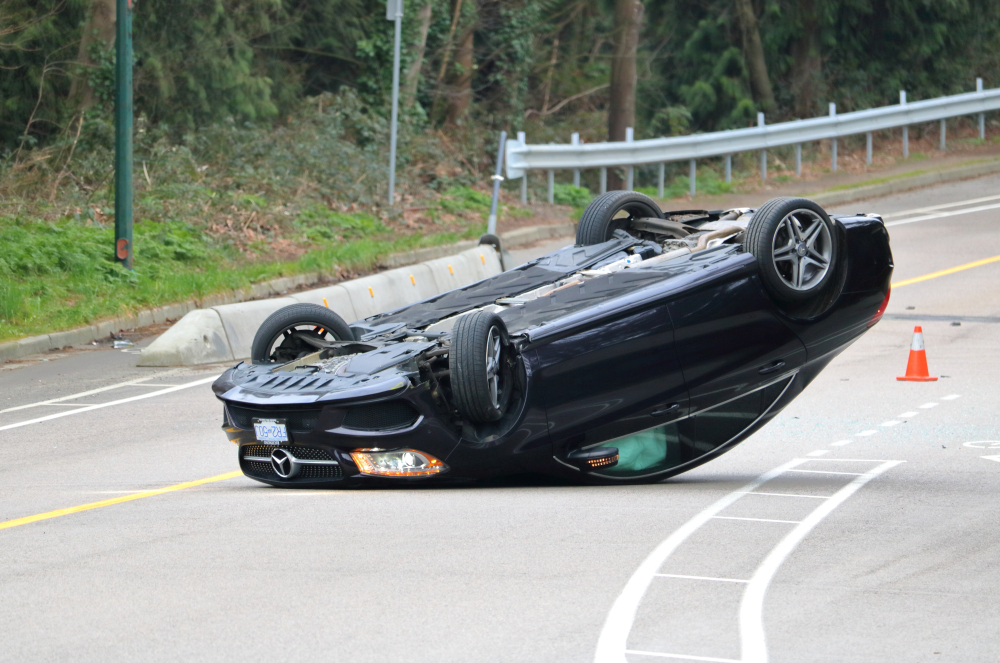Rollovers are often the most serious car accidents. Whether they involve a passenger car, SUV, or other vehicle, rollover accidents can cause catastrophic injuries, lifelong disability, or even fatality. If you were hurt in a rollover accident, you may be entitled to seek damages from any of the responsible parties by filing a personal injury action.
What Is a Rollover Accident?
Although not as common as rear-ends or head-on collisions, rollover accidents are some of the most devastating car crashes. Rollover accidents happen when a vehicle flips over onto its roof or side. The impact can cause a victim to be thrown from the vehicle or slam into the dashboard, steering wheel, or door — even while wearing a seatbelt. As the vehicle rolls over, “cabin intrusion” can also occur, causing the roof or sides of the vehicle to cave in on the occupants.
Proving Negligence in a Rollover Accident
Before you can recover compensation for your injuries in a lawsuit for a rollover accident, negligence must be established. Specifically, in a multi-vehicle accident, another driver may be held liable if you can show they owed you a duty of care that was breached, causing you to suffer injuries and incur damages. Some common causes of driver negligence in rollover accidents can include the following:
- Speeding
- Driving under the influence
- Texting while driving
- Distracted driving
- Failure to obey traffic signals
Sometimes rollover accidents only involve one vehicle. While the cause of single-vehicle accidents is often driver error, there can also be external factors that contribute to the accident. For instance, if a road defect led to an accident, a municipality may be held responsible if they knew about the dangerous condition and failed to repair it. A manufacturer might be accountable if the crash was caused by a defect in the vehicle or one of its parts.
Monetary Compensation for Rollover Accidents
If you can establish that the negligence of a third party caused the rollover accident, you may be able to recover damages in a personal injury action. Evidence to prove negligence in rollover accidents can include witness testimony, accident reconstruction, photographs, video footage, and physical evidence on the vehicle itself. Critically, to recover compensation, you must also establish through medical evidence that you sustained what New York law defines as a “serious injury.”
A victim in a rollover accident may be eligible to recover both their economic and non-economic damages. Economic damages can include unreimbursed medical expenses, lost wages, future lost earnings, out-of-pocket costs, and other monetary losses in connection with the accident. Non-economic damages are meant to compensate a victim for the pain and suffering, loss of enjoyment of life, and mental anguish they experienced due to their accident-related injuries.
In the event you have been in a rollover accident, it is crucial to seek medical attention immediately following the crash. Not only is this essential to rule out any internal injuries, but it is also imperative to document your claim. Medical evidence is the foundation of every personal injury case — without it, you will not have a viable claim.
Contact an Experienced New York Personal Injury Attorney
If you were in a rollover accident, you may have suffered life-changing injuries. It’s important to have an experienced personal injury attorney on your side to help ensure you obtain the maximum compensation to which you are entitled. The Dearie Law Firm, P.C. has been assisting car accident victims for more than thirty years obtain the verdicts or settlements they deserve.
The Dearie Law Firm, P.C. has convenient office locations in Manhattan, the Bronx, and Brooklyn, as well as mobile locations serving Brooklyn, Queens, Manhattan, the Bronx, Staten Island, Westchester County, Rockland County, Nassau County, and Suffolk County. Contact us today for a consultation.

